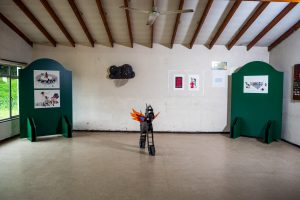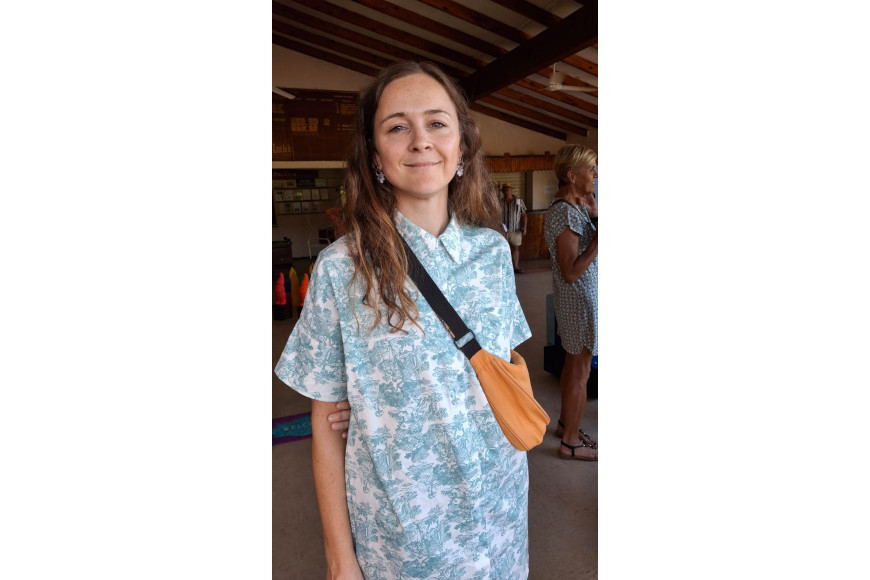Durban-born and based practicing artist and a lecturer at the Durban University of Technology (DUT), Jess Bothma (34 ) was over the moon, having graduated with her Masters in Fine Art with distinction at the 2025 Spring Graduation, held at the Olive Convention Centre in Durban on Friday, 19 September 2025.
“I’m overjoyed to finally be at the stage of graduating after quite a few challenges and delays, I feel really affirmed in my abilities after being examined and receiving a distinction. I am really grateful to my incredible friends, family and colleagues who have supported me,” she shared excitedly.
Bothma is currently employed in the Fine Art department and teaches second and third year sculpture, which she thoroughly enjoys. She also works as an artist and she belongs to a studio and collaborate with other artists on a variety of projects.
Speaking about her work, Bothma indicated that most of her work is quite sculptural and 3Dimensional but she also engages with collage, drawing and creative writing.
Sharing her experience at DUT in the faculty of Arts and Design had been quite tricky at times for Bothma. “It has been difficult to manage the role of student and staff member simultaneously, I’ve often felt like a chameleon, becoming the thing that was necessary at any given moment. I finished my BTech in Fine Art in 2014 and have worked in the arts industry since then. Making the transition back into studying was quite a challenge, but the academic experience and opportunity to do research and make a body of work have been invaluable to me,” she relayed.
Bothma gave a snapshot of her dissertation and some findings. The title of her dissertation is: My Umbilical Cord Has a Knot in it: An Artistic Investigation into the Awkwardness of Belonging in South Africa.
 “This practice-based research project explores the complex relationships between belonging, identity, dislocation, and home in post-apartheid South Africa. The project consists of an installation of two and three-dimensional artworks and this supporting dissertation. Engaging with the contested nature of belonging through the lens of awkwardness, my practice aims to deepen an understanding of the nuances surrounding notions of identity and the sense of belonging to place and community,” she highlighted.
“This practice-based research project explores the complex relationships between belonging, identity, dislocation, and home in post-apartheid South Africa. The project consists of an installation of two and three-dimensional artworks and this supporting dissertation. Engaging with the contested nature of belonging through the lens of awkwardness, my practice aims to deepen an understanding of the nuances surrounding notions of identity and the sense of belonging to place and community,” she highlighted.
This supporting dissertation, added Bothma, contextualises the artwork and positions it alongside the work of other South African artists, as well as relevant theoretical discourse.
“Drawing on the theories of Homi Bhabha, Benedict Anderson and Sara Ahmed, I examine the nature of belonging and Bhabha’s notion of ambivalence as it connects to the idea of awkwardness. Through visual analysis of the work of Andries Botha, Berni Searle, Walter Battiss and Athi-Pathra Ruga, I position my practice and highlight the similarities in technical and conceptual approaches as they pertain to my own artistic practice,” she said.
Bothma further indicated that the project’s creative approach to understanding belonging contributes to the academic field of Fine Art and the broader cultural community.
“This research offers alternative perspectives for navigating complexity, encouraging a dynamic and inclusive understanding of belonging and not belonging in a South African environment. Ultimately, this project seeks to inspire a celebration of awkward spaces and the potential to approach challenging and contested social issues through creativity, humour and irony. This approach positions belonging as a rich, multifaceted and ever-evolving concept that requires creative forms of negotiation. By embracing flux and uncertainty, this research aims to inspire individuals and communities to reconceptualise how they perceive their own sense of belonging, fostering a more inclusive, creative and compassionate society,” she expressed.
Bothma indicated that throughout her academic journey, she follows the DUT values and principles of honesty, respect and integrity, conducting her study as a South African, writing into some of the less desirable past as well as the potentially chaotic present that one finds one’s self in.
“I also engaged in these values when looking at the artworks discussed in my study by other South African artists. I would also assume I associated with all the principles, fairness, compassion, professionalism, commitment and Excellence. I think it would be difficult to achieve a research project of this scale and be awarded a distinction without having these principles,” she emphasised.
In terms of her study, Bothma highlighted that is is fine art based, and practice based as she is a practicing artist, her research questions fulfil her curiosity around belonging in a post-colonial and post-apartheid context in South Africa. “Identity, belonging and alienation are elements of our shared humanity and culture that interest me,” she added.
Going forward, she would like to pursue a PhD and follow on a tangent that she had discovered in her work around the capacity for humour to become a tool for survival. “I would like to continue as a practicing artist, as well as commit to more research and to teach as I enjoy engaging with students and helping their creative paths develop,” she said.Her advice to students wanting to embark in the same career is to take their time.
“Write down your ideas and keep making, also find reliable people along the way who you can trust to give you feedback and advice, and don’t forget that you have a voice and important things to share, you just need to figure out what you’re saying and how to share it,” she relayed.
Photography: Wanda Hennig/Niamh Walsh-Vorster.
Waheeda Peters

